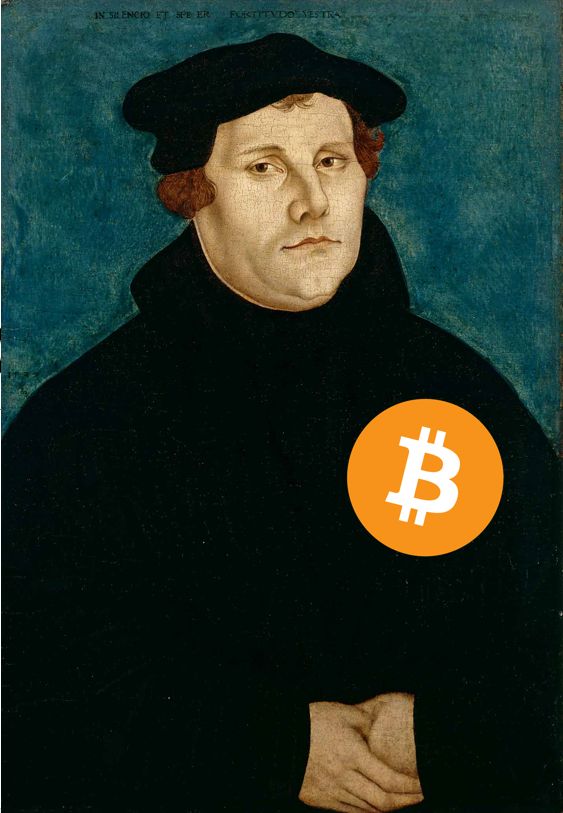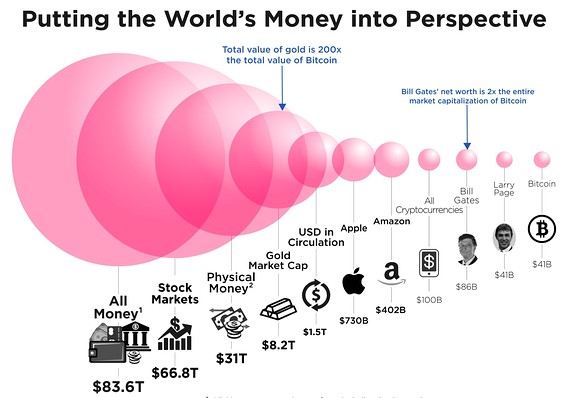
There are many similarities between Martin Luther and Satoshi Nakamoto, the main one being they both began revolutions.
Martin Luther, a German Professor of Theology at the University of Wittenberg, challenged the 'gluttonous' dominance of the Catholic Church by hammering his Ninety-Five Theses to the door of the local All Saints Church. A paradigm changing act.
Fast forward over 491 years later, and once again the scent of change hangs heavily in the air. The British vote to leave the European Union and the victory of Donald Trump in the 2016 presidential election are the beginning of another era of history. However, arguably, the most important fundamental change in bringing about this new era was made by one man, his name; Satoshi Nakamoto. This time, the orthodoxy being challenged was that of the International Financiers and the Federal Reserve. Nakamoto effectively nailed his own thesis to the door with his white paper “Bitcoin: A Peer-to-Peer Electronic Cash System”. Just like Luther, Nakamoto began an era of change. Luther helped found the protestant church, which would grow and branch off in a similar manner to Bitcoin and the creation of other cryptocurrencies now in existence today.

The origins of Bitcoin and the Protestant Church both have their footings in displeasure with the prevailing system of the time. In the 16th century the Catholic Chruch had extreme power and influence. Monks and Priests grew lazy, and rich from the sale of indulgences and simony, which many saw as being at odds with the original principles of Christianity. In the modern era, banks and bankers are seen in the same light, having committed what many consider acts of thoughtlessness and greed. Now, instead of the Church selling indulgences to forgive sins, it is governments bailing out 'too big to fail' banks despite their appalling actions, such as those that caused the subprime mortgage crisis of 2008, that anger the masses. Millions watched as Cypriot banks took money from their customers to bail themselves out, and economies began to collapse. As a result, in 2008 came Bitcoin and the blockchain, to lead a revolution against the banks. Nakamoto promised to ‘cut out the middleman’ with a system ‘based on cryptographic proof instead of trust', in a similar manner to the protestants cutting out priest’s control of services in Latin. Right in front of our eyes, we saw the democratisation of money, in a similar manner to the reformations democratisation of prayer.
However, it must be remembered, the reformation that started in 1517 spawned much upheaval and to the 30 years war, one of the most devastating religious wars ever fought. Some believe those who control our current system, like the Catholic Church of old will not give up the fight easily. As we move into the 21st century and the West begins to flirt with totalitarianism, the threat of a cashless society which can be easily manipulated by those at the top seems imminent. Cryptocurrency comes as a remedy and provider of freedom to those who do not wish to be a part of this system. However, will those at the top simply roll over and let crypto move on by to take their place? I certainly do not think so, however, I believe the battle will be more easily won for cryptocurrency than the 30 years war.
The cryptocurrency revolution still has almost infinite room to grow and spread. In places such as China where the housing bubble looms above all, and monetary and fiscal policy is tightly controlled by the Communist Party, cryptocurrency provides a safe haven for those wishing to preserve their assets. The same safety net is also available for places such as Zimbabwe and Venezuela, where hyperinflation is rife. Developing nations in Africa can use cryptocurrency to curb corruption.
Nakamoto’s revolution is still in its infancy. The cryptocurrency market capitalisation of $120 million, less than Amazon's $402 billion dollar net worth, and $34 billion more than Bill Gates’ net worth of $86 billion. Arguably, the best is yet to come. The Crypto World is only going to get bigger, and the prospect of financial ruin on the horizon for many heavily indebted countries, we can expect it to get bigger at an exponential rate.

We will see currencies come and go, volatility beyond belief and perhaps even opposition from the current top dogs of finance, but believe me, this is just the beginning, crypto and the blockchain are the new reformation.
Congratulations @stevg! You have completed some achievement on Steemit and have been rewarded with new badge(s) :
Click on any badge to view your own Board of Honor on SteemitBoard.
For more information about SteemitBoard, click here
If you no longer want to receive notifications, reply to this comment with the word
STOPDownvoting a post can decrease pending rewards and make it less visible. Common reasons:
Submit
I believe you are right about this being just the beginning. One thing I wonder about...is Satoshi a person...my personal theory is that it is a group of people. But that's one opinion among millions. Interesting comparison.
Downvoting a post can decrease pending rewards and make it less visible. Common reasons:
Submit
Bitcoin is based on tech invented by the NSA. I don't think Satoshi Nakamoto is a single person either. I did so just for the sake of the article.
Downvoting a post can decrease pending rewards and make it less visible. Common reasons:
Submit
I'm thinking we are on the same page. NSA, DARPA or some such. Or possibly a think tank.
Downvoting a post can decrease pending rewards and make it less visible. Common reasons:
Submit
I wasnt really old enough to buy Bitcoin when it was first created, but I thought it could be some sort of new world order money. Nakamoto owns 1 million bitcoins, so if he was the NSA then he would have a large sway over it. This could potentially be the topic for another article, no?
Downvoting a post can decrease pending rewards and make it less visible. Common reasons:
Submit
Great article, but one typo: 120 million should read 120 billion
Downvoting a post can decrease pending rewards and make it less visible. Common reasons:
Submit
My apologies!
Downvoting a post can decrease pending rewards and make it less visible. Common reasons:
Submit